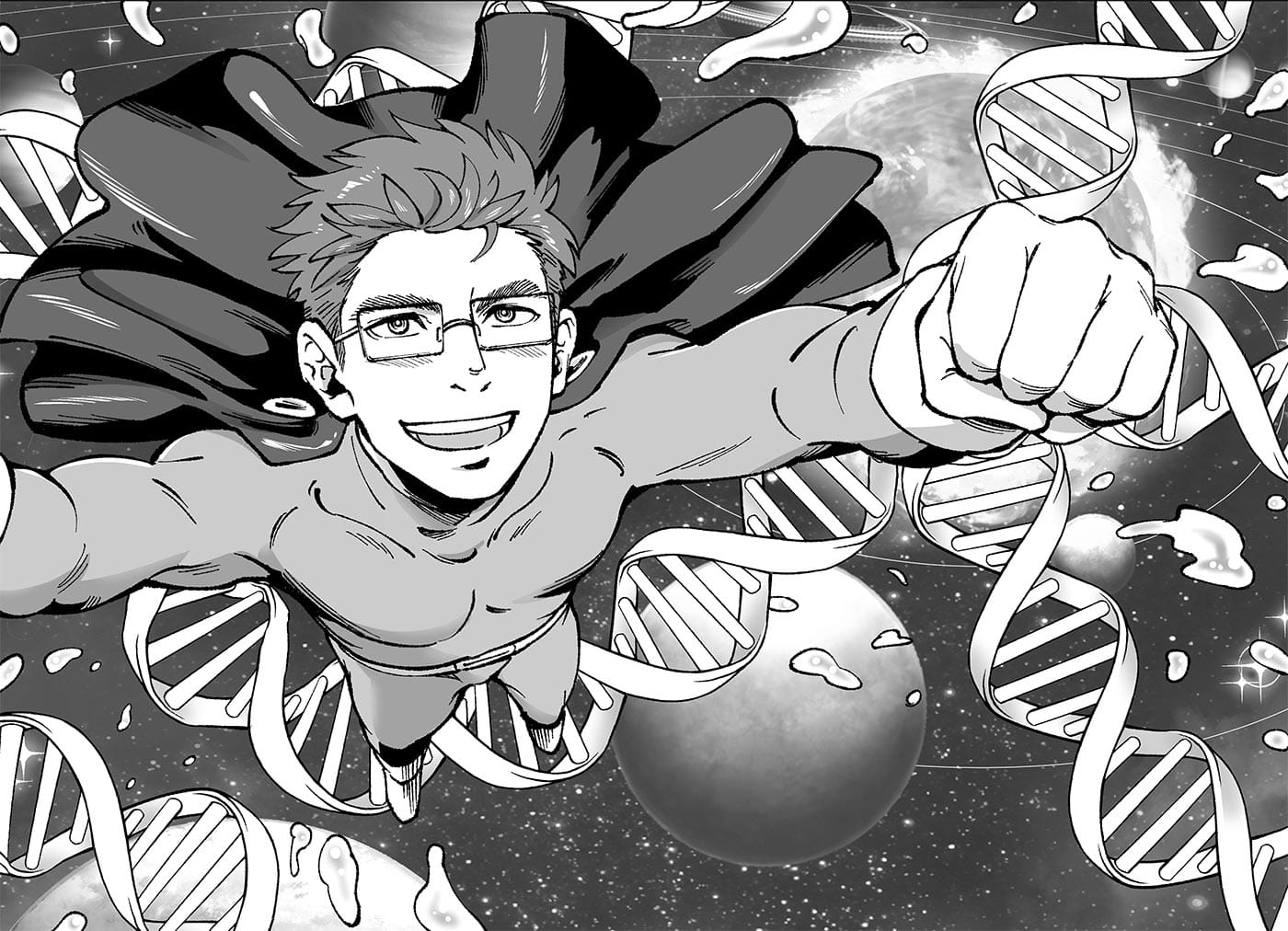
Since 2021, the Vilcek Foundation has partnered with immigrant manga artist Hiroki Otsuka to creatively amplify the remarkable contributions of immigrants through biographical manga. Whether they are aiding in the microscopic fight to keep us healthy or advocating for the arts, immigrants are everyday superheroes bettering our society.
Harris Wang, PhD, associate professor of systems biology, pathology, and cell biology, is one such hero. In this sixth edition of our manga comics, Otsuka highlights Wang’s bold work to fight bad guys—on the microscopic scale, that is!
Born in Beijing, Wang was awarded the 2022 Vilcek Prize for Creative Promise in Biomedical Science for his ingenious work in synthetic biology. This multidisciplinary field artificially replicates elements and models found in nature to solve problems that affect everyday life.
Wang used this process to create Multiplex Automated Genome Engineering (MAGE). This platform is able to replicate and ultimately reprogram entire genomes, which is just what Wang did! He re-created and then altered E. coli, a bacteria that lives in our gut. This breakthrough has massive implications for medicine, biology, and individual microbiome health—pretty super!
Just like in gut health, Wang believes that diversity in scientific research is crucial. As he says, “You can learn a lot from the tiny world inside you!”










Our other manga feature superheroes include molecular biologist Mohamed Abou Donia, filmmaker and musician Blitz Bazawule, neuroscientist Viviana Gradinaru, architect and urban planner Denise Scott Brown, and chef Fabián von Hauske Valtierra.
More on our Manga artist
Born in Japan, Hiroki Otsuka has been a professional manga artist since 1994. His work has appeared in major Japanese publications and in galleries and art fairs in New York, Tokyo, and Basel, and in the Museum of Contemporary Art, Los Angeles.
Manga Transcript
Dr. Harris Wang: 2022 Vilcek Prize for Creative Promise in Biomedical Science
Did you know that trillions of microbes live inside you? It’s true, my friend. Thousands of different species, too. Together, they’re called the microbiome. And they make you a healthier person.
But one fact has become alarmingly clear…
…the overuse of antibiotics and an imbalanced diet in modern life has drastically peaked our microbiome.
I’m not just talking stomachaches! A mighty microbiome can protect us from heart disease, obesity, inflammation, mental illness… the list keeps growing!
As a synthetic biologist, I can engineer microbes in many different ways. For instance, by adding a tiny tracker on them, I can record where they go and understand their world…
Their stories are extraordinary! They helped me see what microbes do, individually and as a group. Some digest food or process medicines…
…some help train the immune system…
…and they can even repel bad microbes. So how can we make our microbiome stronger? This gave me an idea.
I started to ask… what if we build new heroes to send into this tiny world? I’m perfectly serious! Synthetic microbes could be our best allies. They would watch and regulate what we digest. Create and deliver new medicines. Fight off pathogens and promote health and healing all across the body. They can even train our own microbiome with these new skills.
It’s challenging work. But engineering the human gut microbiome could be a lot like… well, changing a faulty gene in the body. You have to fix one problem without upsetting a delicate system.
Isn’t it exciting to uncover a new world? And then make a difference in it?
Reminds me of coming to America at age nine… It was lonely. A new language. New culture.
Like a new bacterium, I learned to fit in and express my own special qualities. I became a part of my thriving community.
My talent was in the sciences. That meant I had a few tricks—like the bacteria I later created, I could learn to help the world around me function a little better.
In tinkering carefully with DNA—creating microbes with new abilities—I found my calling.
If we can begin to understand the worlds inside us, we can begin to heal what’s broken. We’ll reverse the damage that modern life caused the microbiome.
And a diverse microbiome—well, that’s a good model for us all. Isn’t it?
Science works better with a richness of perspectives, too. And as far as I’m concerned, society follows that same rule. Millions of contributors, doing their part.
Related News
Harris Wang: Using synthetic biology to understand our world

Worlds Inside: Manga Explores the Work of Biochemist Mohamed Abou Donia

Mohamed Abou Donia: “How our microbial partners affect our health.”

You may also be interested in
Harris Wang

Mohamed Abou Donia

Martin Jonikas
